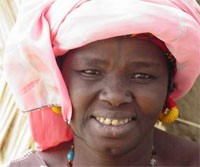The Bagas are composed of seven groups, which speak different dialects: Baga Sitemou (also known as Sitemu), Baga Mandori, Baga Kaloum, Baga Koba, Baga Fore, Baga de Monchon, and Baga Mboteni. The Bagas are found along the Atlantic coast in northern Guinea.
They fled Islam when the people of the Mali Empire brought it, and they also rejected Islam very early when the Fulbe brought it.
The Baga Sitemu live by rice farming and fishing. They live in rather obvious societal groups. They are open to strangers. They respect both the traditions and the Muslim and Catholic religions. The women work separately from the men, except in a few villages. The women prepare all the food while the men sit down after their day's work. The food is served in three different bowls, one for the men, one for the women, and one for the children. The men share their common bowl, and the women also share a common bowl. After eating, the women gather their leftovers and those of their husbands for the children.
Under the light of the moon, with the light filtering through the palms, the bride-to-be is carried in a hammock from her parents' house. Four men carry her above their heads, as she makes a tour of the village. Dancing to her husband's house, the villagers put her down at her new home.
Officially, the Baga Sitemus are Muslims, but they carry much animistic baggage. At night, the women have their meeting to consult the spirits on behalf of the village. They want to learn whether the spirits who are watching or entering the village are evil. If a spirit is present, it will cause a woman to fall to the ground in a trance. Frequently the women look for spirits who will protect their whole village.
Islam and Catholicism are both mixed with their traditions. Bagas also believe in spirits and in marabouts, Muslim holy men who can make charms to ward off evil spirits. When they have a problem, they first consult the genie and the jinn (spirits), which demand a blood sacrifice. This blood sacrifice is usually a white or red chicken or a sheep. If no rain comes, they also consult the genie, and each family contributes money in order to buy a cow, which they will kill and give to the wise men. These men will eat this meat alone under the permission of invisible genies in the forest, under a large tree. Usually, the requests stir the spirits, but their response is not long-lived. So it is often necessary to renew the sacrifice. One of the largest idols of the region is Nimba, a Baga idol of fertility. Usually painted black, this idol stands on four legs, with the head of a ferocious animal, and large human-like breasts. This figure has been used often to represent Guinea, and one can find them pictured on the money of the country.
The Baga Binari people need the chance to put their faith in Christ alone. As it stands, their faith is in the teachings of Islam and their traditional gods.
Pray for Holy Spirit-directed workers to go to the Baga Sitemu.
Pray for their elders to open the door for their people to embrace Jesus Christ.
Pray for spiritual hunger that will draw them to the King of kings and Lord of lords.
Pray for a movement to Christ among this Muslim people group.
Scripture Prayers for the Baga Sitemu, Tchitem in Guinea.
Ethnopedia, Copyrighted Used with permission.
| Profile Source: Joshua Project |










